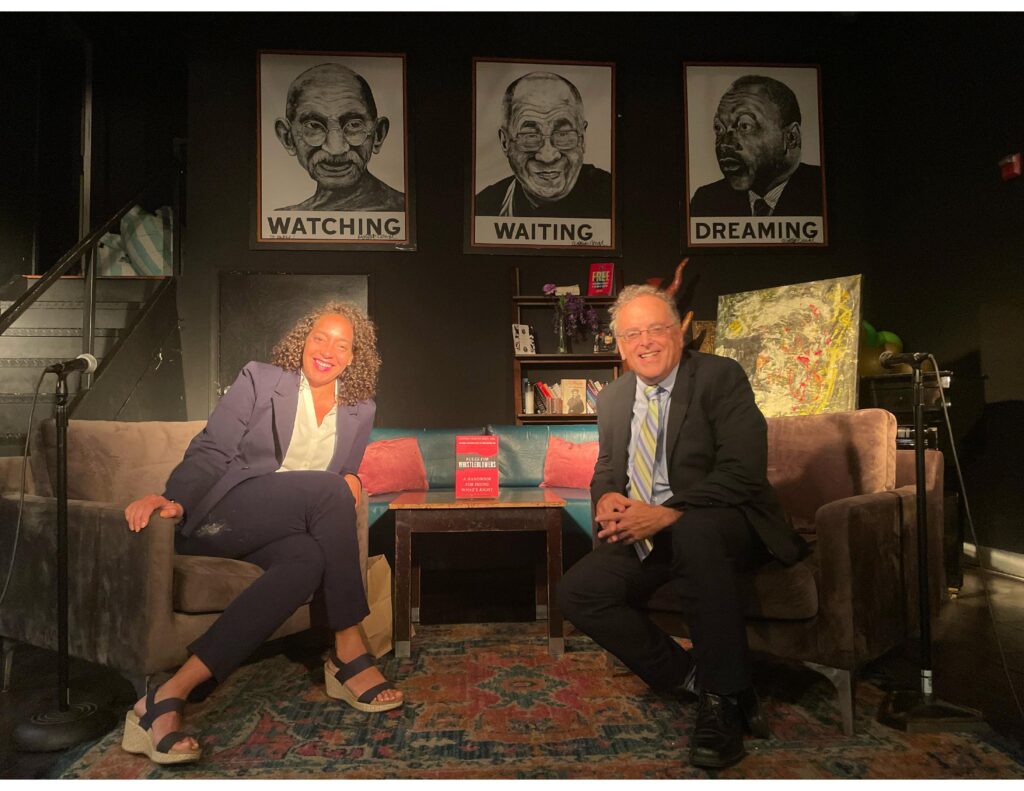On Monday, September 18, renowned whistleblower attorney Stephen M. Kohn, the most-published author on whistleblowing, spoke at Washington D.C.’s Busboys & Poets about his new book, Rules for Whistleblowers: A Handbook for Doing What’s Right.
The book explains new whistleblower laws, like the Anti-Money Laundering Whistleblower Improvement Act, which Kohn, a founding partner at Kohn, Kohn & Colapinto, played an instrumental role in drafting and advocating for passage. Moreover, it responds to unprecedented attacks aimed at whistleblower laws by proving how vital whistleblower protections are to the American project.
Rules for Whistleblowers was written with two audiences in mind. The first audience, said Kohn, “are the whistleblowers who come to my office and sit on the couch and tell me their story. I know already that they could have won their case, but they’ve already lost it.”
The second is “every single American, so they understand why this is a fundamental human rights and civil rights issue.”
The Message for Whistleblowers
Whistleblowers representing themselves have won their cases using the knowledge they gained from Kohn’s books. The Rules book provides potential whistleblowers with an accessible guide for how to hold the most powerful entities accountable – including federal agencies, corporations, and corrupt international leaders – using the United States’ effective whistleblower laws.
In Rules for Whistleblowers, Kohn elaborates on the progression of whistleblower protection under the Dodd-Frank Act, which passed in 2010, just before Kohn’s previous book. The world of whistleblowing has dramatically changed since then because Dodd-Frank, Kohn explained, has “revolutionized whistleblowing beyond anyone’s imagination, including those who wrote the law.”
The principles of percentage awards and anonymity have transformed the landscape of whistleblower laws. The government realized it was more effective to reward whistleblowers for the value of their information rather than for how much retaliation they suffered.
“The government wants you to stay employed. They want you to remain within the criminal enterprise so you can gather more evidence. All of a sudden, you’re seeing the largest white-collar prosecutions imaginable: multibillion-dollar sanctions, all driven by the whistleblower.”
The Message for All Americans
Siri Nelson, Executive Director of the National Whistleblower Center, moderated the event. She reflected on the book’s capacity to prepare whistleblowers themselves, she said, “It’s also a treasure trove of stories.” These stories are critical for the public to read because they help us understand – in Nelson’s words – “what courage and sacrifice it took to get to where we are today.”
The notion that whistleblower rights are not a whistleblower-specific issue but rather an American issue was resonant throughout Kohn’s talk. The laws have broad public support and bipartisan political coalitions because the public understands whistleblower protections are necessary to stop fraud.
“We can document that the United States government has collected over $100 billion from cases brought by whistleblowers and deterrence of hundreds of billions,” said Kohn. “It’s the success of these laws that drives better laws – people need to know that.”
He continued to explain that the crimes reported by whistleblowers are “committed by the most educated, powerful members of society. And therefore, misconceptions about ‘who a criminal’ play to their advantage. But white-collar criminals attack the fundamental principles of American institutions.”
Whistleblower laws deter white-collar crime and hold white-collar criminals accountable, returning money to the pockets of the people. For these laws to pass successfully, the public needs to be engaged.
Over 200,000 people wrote letters, sent emails, and made calls to pass the 2022 Whistleblower Improvement to the Anti-Money Laundering Act. Kohn said that these grassroots efforts must continue to keep up the momentum and defend against increased attacks on whistleblower protections.
Kohn created a free Whistleblower Law Library, which summarizes each Rule in the book. Proceeds from the sale of Rules for Whistleblowers support the work of the National Whistleblower Center to protect whistleblowers and advocate to further improve whistleblower laws.
